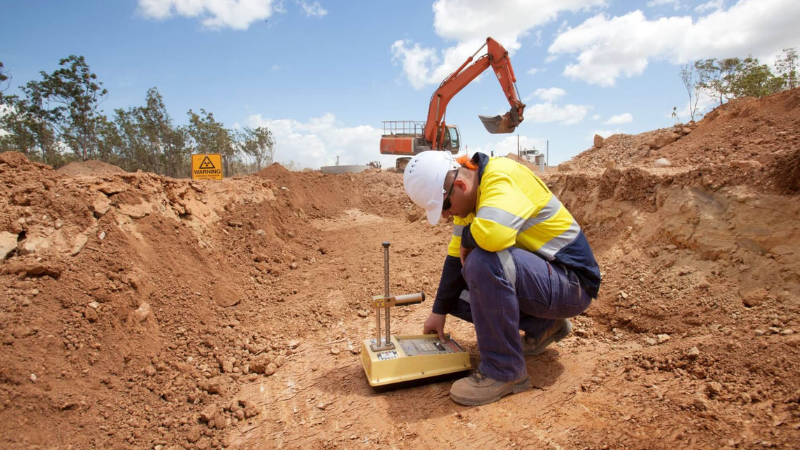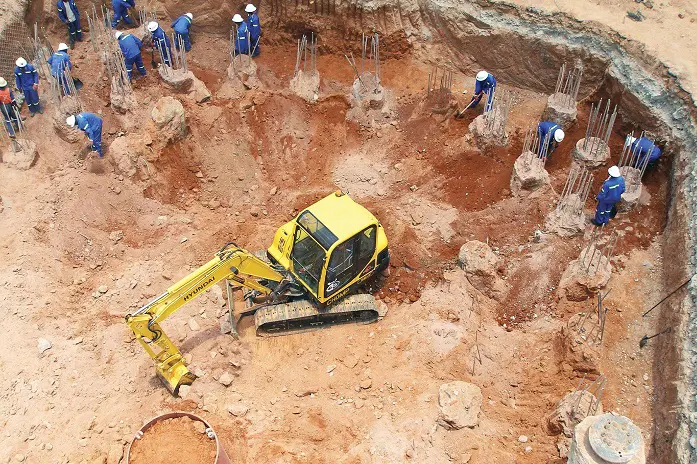Important Skills for Flourishing in the Geotechnical Industry Today
Important Skills for Flourishing in the Geotechnical Industry Today
Blog Article
A Detailed Review of the Trick Obligations of Geotechnical Designers in Website Characterization and Ground Renovation Methods for Design Solutions
Geotechnical designers are indispensable to the successful implementation of engineering projects, charged with the critical duties of site characterization and the application of ground enhancement methods. Their work entails a complete analysis of subsurface problems, using different testing techniques to identify soil and rock buildings.
Function of Geotechnical Engineers
Geotechnical engineers play a pivotal duty in the layout and construction of infrastructure by assessing the behavior of dirt and rock under the surface - geo tech engineering. Their obligations encompass examining subsurface problems to notify style choices that guarantee architectural stability and security. By carrying out detailed analyses of soil buildings, including shear leaks in the structure, compressibility, and strength, geotechnical engineers give crucial data that influences the selection of ideal building and construction products and techniques
In addition to analyzing soil technicians, geotechnical engineers are tasked with recognizing prospective threats such as landslides, sinkholes, and ground negotiations. Their know-how aids minimize risks associated with these geotechnical sensations, consequently shielding both the setting and public safety. They additionally collaborate very closely with other engineering disciplines, guaranteeing that geotechnical factors to consider are integrated right into total job design.
Additionally, geotechnical designers participate in the analysis of existing structures, giving recommendations for retrofitting and repair services when required. Their thorough understanding of soil-structure interaction is important for the growth of lasting infrastructure options. Overall, the role of geotechnical engineers is integral to the successful realization of building jobs, guaranteeing they are safe, resilient, and compliant with regulatory requirements.

Website Characterization Processes
Reliable site characterization processes are important for understanding the subsurface conditions that affect job design and implementation. Geotechnical engineers utilize an organized technique to collect, assess, and analyze information pertaining to rock, dirt, and groundwater characteristics. This procedure starts with a comprehensive evaluation of existing literature and historic website data, offering understandings into previous website conditions and possible obstacles.

Data evaluation follows fieldwork, where designers utilize geostatistical methods to translate searchings for and create geological designs. This modeling aids in recognizing possible geohazards, such as landslides or liquefaction, which are important for threat evaluation. Subsequently, the results educate style recommendations, ensuring that design solutions are both risk-free and efficient. Via persistent site characterization, geotechnical engineers lay the foundation for effective job implementation, minimizing unforeseen difficulties and enhancing resource allocation.
Soil and Rock Screening Methods
While recognizing subsurface problems is vital, the selection of ideal soil and rock testing approaches is just as crucial for precise analysis and layout. Geotechnical designers employ a range of screening methods to evaluate the mechanical and physical homes of soil and rock products.
Research laboratory tests, such as Atterberg restrictions, grain size evaluation, and unconfined compressive stamina tests, provide crucial data on dirt actions under various wetness conditions and loading situations. These tests assist identify dirt classification and forecast settlement or shear toughness attributes crucial for structure style.
In-situ testing techniques, consisting of Criterion Infiltration Examinations (SPT), Cone Penetration Tests (CPT), and stress meter examinations, permit engineers to gather information straight from the ground. These methods supply beneficial understandings into the dirt's thickness, uniformity, and stratification without the need for comprehensive tasting.
Rock screening usually entails core tasting and research laboratory evaluation to examine properties like uniaxial compressive stamina and rock quality classification (RQD) With each other, these dirt and rock screening methods make it possible for geotechnical designers to make informed choices pertaining to site-specific obstacles, making sure the safety and security of engineering solutions.
Ground Renovation Strategies
Ground improvement strategies are crucial for boosting the design residential navigate here properties of soil, thus raising its load-bearing capacity and minimizing settlement. These methods are vital in attending to obstacles offered by weak or bothersome dirts, which can dramatically affect the stability and durability of structures.
Numerous ground enhancement strategies are used, consisting of compaction, grouting, and soil stabilization. Grouting, on the various other hand, includes infusing a fluid material right into the ground to load spaces and enhance soil communication.
Dirt stabilization includes a variety of methods, from chemical ingredients to mechanical therapies, intended at improving the soil's resistance to erosion and deformation. Strategies such as lime stablizing or cement mixing alter the residential properties of the dirt at a fragment level, improving its total performance.
Relevance of Geotechnical Evaluations
Geotechnical analyses play an important role in the planning and design of engineering jobs, as they supply necessary info concerning the subsurface problems. Comprehending dirt properties, rock formations, groundwater degrees, and possible geohazards is essential for making sure the stability and safety and security of frameworks. These evaluations make it possible for designers to make informed choices concerning website selection, layout parameters, and building and construction methods.
The significance of geotechnical assessments prolongs past first job stages; they contribute in threat management and cost performance. By identifying prospective concerns early, such as soil negotiation, slope instability, or extreme groundwater, designers can this link design ideal mitigation methods, reducing the possibility of pricey hold-ups and architectural failings. Moreover, these analyses sustain compliance with governing requirements and improve the sustainability of design practices.

Verdict
Finally, geotechnical engineers are essential to making sure the safety and security of design projects through thorough site characterization and ground improvement strategies. geotech engineer. Their organized method to assessing subsurface conditions, combined with their suggestions for effective ground adjustment, significantly enhances dirt buildings and load-bearing capacity. The expertise of geotechnical engineers not only promotes informed job preparation but also ensures compliance with guidelines and cultivates efficient communication among stakeholders, eventually adding to effective engineering outcomes
Geotechnical engineers play a critical function in the layout and construction of facilities by analyzing the behavior of soil and rock underneath the surface area. By performing detailed analyses of dirt residential or commercial properties, including shear compressibility, toughness, and leaks in the structure, geotechnical designers give crucial information that influences the option of appropriate construction materials and strategies.
In enhancement to analyzing soil auto mechanics, geotechnical designers are entrusted with recognizing possible risks such as landslides, sinkholes, and ground settlements. Geotechnical engineers employ a systematic technique to gather, assess, and interpret data regarding soil, rock, and groundwater characteristics. By More hints identifying prospective problems early, such as soil settlement, incline instability, or too much groundwater, engineers can devise appropriate reduction methods, minimizing the possibility of costly hold-ups and architectural failings.
Report this page